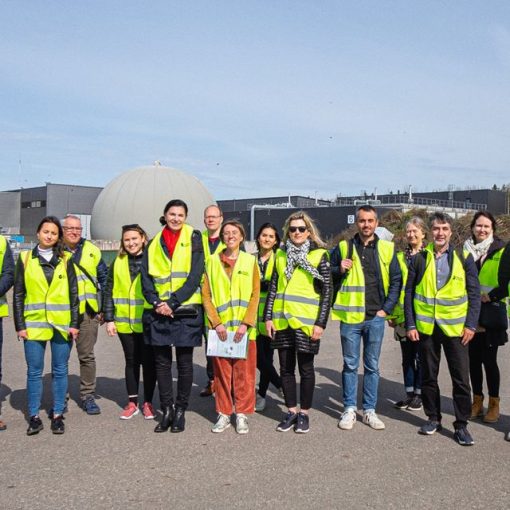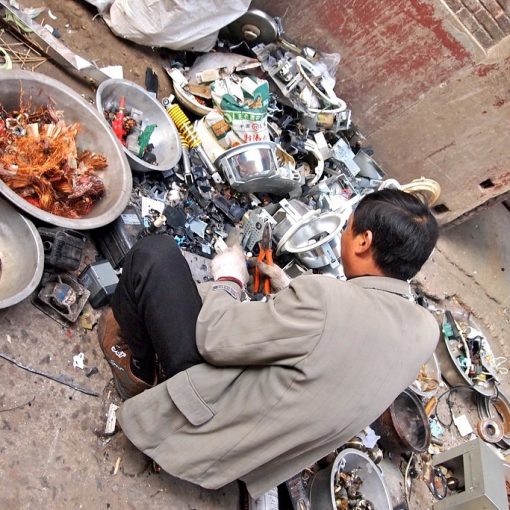An online thematic workshop on sustainable mobility was organised by CECI partners and stakeholders on 26 January 2021. CECI – Citizen Involvement in Circular Economy Implementation, an Interreg Europe project, is led by LAB University of Applied Sciences. Two experts from Finland and Belgium were invited to showcase local mobility solutions.

Sustainable Mobility Promotion through Citizen Engagement
The EU-funded CitiCAP project was presented by Anna Huttunen, a Project Manager from the City of Lahti. Lahti, the European Green Capital 2021, has a very ambitious target of CO2 emission reduction, aiming to become carbon neutral already by 2025. The City Council evaluated and approved the Sustainable Urban Mobility Plan (SUMPS) on 25 January 2021. SUMPS includes 13 measures, e.g. quality cycling networks, winter maintenance, mobility management plans and traffic network, alternative fuels of public transport. (Huttunen 2021.)
Also, a smart bicycle highway with data collection, info screens, projected road signs, smart lighting and bicycle racks, has been built in Lahti (Huttunen 2021).
The world’s first Personal Carbon (PC) Trading scheme, enables trading on mobility emissions. It has been identified as one of the CECI Good Practices and also published on the Policy Learning Platform. The pilot was trialled in 2019-2020 and currently, the results are being analysed. The CitiCAP app lies in defining the city carbon cap and the PC budget allocation that is weekly renewed. The budget is calculated based on the real living situation, set at the beginning of the app use through a survey, e.g. the home distance from the city centre, number of children. The app automatically detects the mode of transport and calculates CO2 emissions. At the end of the week, the achieved PC emissions are compared to the carbon budget. The saved carbon allowances are exchanged into virtual Euros, that can be used for discounts on services and products, e.g. bus tickets, a bike reflector or a cup of coffee. The first results show that 36% of the users have changed their mobility habits and awareness-raising was considered as the key driver. (Huttunen 2021.)

Shared Mobility
Alexandra Winderickx, mobility department of the city of Mechelen, highlighted that 95% of the time, cars remain idle and take up much of the public space. Mechelen has put a lot of efforts into a modal shift of mobility. According to Ms Winderickx (2021), one shared car can replace on average eight private cars.
In the presentation, various commercial and community shared mobility platforms for cars, bikes, e-cargo bikes, and e-scooter were introduced. Also, mobility incentives, necessary for a successful implementation and getting citizens on board, were highlighted. For instance, the Mobility Budget incentivizes (1) the car license plate handing in with up to 250€ refund on shared mobility solutions or a bike purchase, (2) subvention for a shared e-car up to 3000€ refund, and (3) no mobility platform registration fee for shared cars providers (30-35€). Other sharing mobility incentives offer discounts for the first e-car ride, access to free parking and reserved parking spots. Communication campaigns motivating citizens to test and use the more greener transportation modes are essential. Shared mobility in outside the city centre or nearby villages is challenging. (Winderickx 2021.)
Hoppin points connecting various shared mobility solutions together are being developed in Mechelen and the region. These points then provide interconnectivity within and between cities and enhance the modal shift. (Winderickx 2021.)
Author
Katerina Medkova works as an RDI Specialist at LAB University of Applied Sciences and is CECI Communication Manager.
References
Huttunen, A. 2021. CitiCAP: Promoting sustainable mobility through citizen engagement. Presentation at CECI: Thematic workshop on Sustainable Urban Mobility and Shared Mobility on 26 January 2021.
Winderickx, A. 2021. Mechelen: Shared Mobility. Presentation at CECI: Thematic workshop on Sustainable Urban Mobility and Shared Mobility on 26 January 2021.
Links
Link 1. Interreg Europe. 2021a. Project Summary. CECI. [Cited 14 Feb 2021]. Available at: https://www.interregeurope.eu/ceci/
Link 2. City of Lahti. 2020. CitiCAP project. [Cited 14 Feb 2021]. Available at: https://www.lahti.fi/en/housing-and-environment/transportation-and-streets/citicap/
Link 3. City of Lahti. 2021. Lahti European Green Capital 2021. [Cited 14 Feb 2021]. Available at: https://greenlahti.fi/en
Link 4. Interreg Europe. 2021b. Good practice: Personal Carbon Trading (PCT) scheme for citizens. Policy Learning Platform. [Cited 14 Feb 2021]. Available at: https://www.interregeurope.eu/policylearning/good-practices/item/3697/personal-carbon-trading-pct-scheme-for-citizens/
Link 5. Interreg Europe 2021c. Project good practices. CECI. [Cited 14 Feb 2021]. Available at: https://www.interregeurope.eu/ceci/good-practices/
Link 6. Interreg Europe. 2021d. What is the Policy Learning Platform?. Policy Learning Platform. [Cited 14 Feb 2021]. Available at: https://www.interregeurope.eu/policylearning/what-is-policy-learning-platform/
Link 7. Werken aan de Ring. 2021. Hoppin points. [Cited 14 Feb 2021]. Available at: https://www.werkenaandering.be/en/working-on/hoppin-points
Pictures
Picture 1. Oravakangas, P. 2019. CECI promotes shared mobility as it is more sustainable and affordable.




